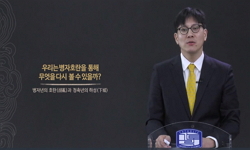After the founding of the Joseon state, Neo-Confucianism was adopted as the theory of statecraft and with the establishment of relatively stable tributary relations with Ming, the two countries became one step closer in governing ideology, moral value...
http://chineseinput.net/에서 pinyin(병음)방식으로 중국어를 변환할 수 있습니다.
변환된 중국어를 복사하여 사용하시면 됩니다.
- 中文 을 입력하시려면 zhongwen을 입력하시고 space를누르시면됩니다.
- 北京 을 입력하시려면 beijing을 입력하시고 space를 누르시면 됩니다.

조선과 명,청의 시가교류(詩歌交流) = A Brief Study of Poetry Exchanges between Joseon and Ming and Qing Dynasties
한글로보기https://www.riss.kr/link?id=A100865136
- 저자
- 발행기관
- 학술지명
- 권호사항
-
발행연도
2015
-
작성언어
-
- 주제어
-
KDC
800
-
등재정보
KCI등재
-
자료형태
학술저널
-
수록면
121-141(21쪽)
- 제공처
-
0
상세조회 -
0
다운로드
부가정보
다국어 초록 (Multilingual Abstract)
After the founding of the Joseon state, Neo-Confucianism was adopted as the theory of statecraft and with the establishment of relatively stable tributary relations with Ming, the two countries became one step closer in governing ideology, moral values, and literary forms. Contact between Joseon and Ming fundamentally consisted of visits by both countries’ emissaries. The majority of the emissaries were elite literati by virtue of accomplished literacy, and their diplomatic etiquette, official communications, and personal feelings were expressed in the form of poetry and rhapsodies. Thus poetic anthologies of historic significance were passed down and remembered by many in both countries. The Collection of Imperial China (Hwanghwajip) compiled in the Joseon Dynasty not only exerted great influence in Joseon literary circles, but was evidence of poetic exchange between Joseon and Ming. Since the two countries’ emissaries chose this particular method of diplomacy, academia refers to it as “poetry diplomacy.” Joseon gradually overcame its contempt towards the Later Jin and early Qing culture in the late Joseon, and intercourse with the Qing increased on all fronts, particularly with the formation of the Northern Learning School. This developed and deepened poetic exchange between the two countries. The various literary forms embraced in the poetry of the High Qing period also exerted a great influence in Joseon academia, and triggered a new mania over the Eight Great Prose Masters of the Tang and Song revered by Joseon literati. As relations between Joseon and Qing became balanced and relaxed, poetic exchange between the countries’ literati diversified and evolved. Joseon poetry especially was introduced to China in mass quantities through various avenues, influencing Chinese literary circles to an extent, and was historically significant in causing profound positive interactions. Exchange between Joseon and Ming/Qing literati was not only limited to simple contact out of etiquette, but in several areas such as literature, friendship, and sentiments. At the same time, both countries came to know and influence each other through various poetic and literary anthologies which saw the mass circulation of the poetry of some Joseon literati in Qing. Aside from this, scholars who traveled as emissaries to China such as Kim Sang-hon, Hong Tae-yong, Yi Dok-mu, Yu Duk-kong, Pak Che-ka, and Pak Chi-won left behind many poems in their travelogues and poetry anthologies, making distinguished contributions to later China-Joseon poetry exchange in their time.
동일학술지(권/호) 다른 논문
-
- 연민학회
- 윤덕진 ( Dug Jin Youn )
- 2015
- KCI등재
-
- 연민학회
- 이우창 ( Chang Liu )
- 2015
- KCI등재
-
- 연민학회
- 이장우 ( Jang Wu Lee )
- 2015
- KCI등재
-
덕곡(德谷) 조승숙(趙承肅)의 생애와 후대의 평가: 수양명월(首陽明月) 율리청풍(栗里淸風)
- 연민학회
- 윤호진 ( Ho Jin Yun )
- 2015
- KCI등재




 KISS
KISS






